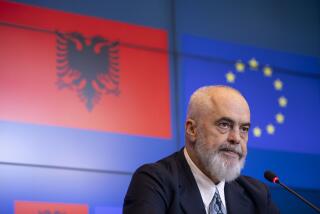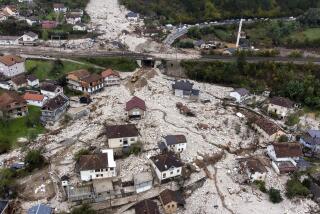Harboring Refugees Is Delicate Balancing Act
- Share via
BRUSSELS — With Europe in the throes of its worst humanitarian disaster since World War II, the United States and many European nations can’t agree on how best to help the victims--the panicked ethnic Albanians flooding out of Kosovo.
As the “forced, planned and directed” exodus from the Serbian province exceeded 400,000, according to U.N. High Commissioner for Refugees Sadako Ogata on Tuesday, the United States, Canada, Turkey and several European countries were taking initial steps to temporarily welcome an estimated 100,000 of the displaced.
Of the neighboring countries they have fled to over the past two weeks, Albania--the poorest nation in Europe--now contains so many refugees relative to its population that a NATO official calculated it would be like unleashing 20 million asylum applicants all at once on the United States.
In neighboring Macedonia, there are widespread concerns that the throngs of ethnic Albanians from Kosovo already admitted or waiting in a muddy no man’s land at the frontier could upset the fledgling state’s delicate social and political balance.
In the calculus of many European leaders is the firm determination not to allow Yugoslav President Slobodan Milosevic’s “ethnic cleansing” campaign against Kosovo’s majority population to become a fait accompli. But there are also weighty domestic considerations: In some countries, accepting more foreigners, needy refugees or not, could be political suicide.
The first airlifts from the region this week carried about 2,000 of the Kosovo refugees to Norway and Turkey, some of them against their will and minus other members of their families. The Clinton administration is planning to receive 20,000 refugees, housing them on the U.S. naval base at Guantanamo Bay, Cuba.
Umberto Ranieri, Italy’s undersecretary of foreign affairs, said that “we disagree with the idea of transferring the refugees to lands and countries very distant from the region,” arguing that it only makes returning people to Kosovo a more remote possibility. French Prime Minister Lionel Jospin said Tuesday that his country might accept “a certain number” of ethnic Albanians but that it is better “not to add a forced transfer to a deportation.”
One persistent fear across Europe is that the refugees, once they see the bright lights of Berlin or Birmingham, won’t want to go back to the rustic hillside hamlets of Kosovo. They might, it is argued, become permanent exile communities in the countries granting them temporary residency.
“The further away people are from home, the more difficult it is for them to go back,” Emma Bonino of Italy, acting humanitarian affairs commissioner of the European Union, said in an interview.
Of the 400,000 people who fled to Germany to escape another recent conflict in the Balkans, civil war in the former Yugoslav republic of Bosnia-Herzegovina, Bonino said 100,000 are still in Germany, although the war ended in 1995.
“People are not parcels,” the commissioner said. “They cannot be moved around like parcels.”
But she stressed that it is her impression that most of the refugees will want to return home. “This is a community with strong links to the land,” said Bonino, who toured the refugee camps last week and has dealt with the Kosovo Albanians for a decade. “Their dream is not to live in Los Angeles. They’ve had only one dream for the past 10 years--to live free on their land.”
Forced to formulate a policy to deal with this humanitarian emergency, Germany has agreed to take in 10,000 of the ethnic Albanians. But Roland Koch, a member of Germany’s opposition Christian Democrats who is governor-designate for the state of Hesse, argues that his country now “has reached the limits of its capacity to accept refugees.”
Since March 30, Italy has sent 1,700 of its soldiers to the other side of the Adriatic to build tent cities in Albania for the refugees. Sergio Romano, political commentator and former Italian ambassador to Moscow, says that the leaders in Rome, like those in some other Western European countries, are driven in large part by fears of an unmanageable refugee flood.
“They know that the logical way to ease tensions in the Balkans is to lift some of the refugee burden from Albania, which is going to be overwhelmed if this goes on,” Romano said. “But they’ve got their own problems at home, so they try very hard to help the refugees on the spot.”
Italians, in particular, are concerned that more Kosovo refugees might lead to more violent crime. Among the several thousand clandestine immigrants from Albania over the last two years, some became involved with violent gangs in Milan and other cities.
On the issue of accepting refugees, the Labor government of British Prime Minister Tony Blair wavered for days. Finally, on Sunday--and under U.S. pressure, according to several London newspapers--the British agreed to accept “several thousand” of the ethnic Albanians, although Blair himself had warned “against dispersing these people around Europe.”
“We are all agreed that the permanent solution, the long-term aim, must be for the refugees to be able to return to Kosovo and rebuild their shattered villages,” British Foreign Secretary Robin Cook said.
“Anything less than that would be a reward to Milosevic for ethnic cleansing.”
Kris Janowski, spokesman for the Geneva-based Office of the U.N. High Commissioner for Refugees, contends that current circumstances don’t give relief agencies many options. For instance, to win Macedonia’s assent to allow thousands of languishing refugees entry, the U.N. commission and Western governments must commit themselves to moving a sizable portion of the refugees elsewhere.
“Flying people out is not our favored solution, or anyone else’s,” Janowski said in an interview. “But it is the only solution for keeping the border open.”
Bonino has proposed relocating the refugees to Eastern and Central European countries closer to home--Bulgaria, Romania, Hungary, Slovenia, Croatia and Bosnia among them--and having the EU pick up the tab for their upkeep. Bulgaria refused, but visiting U.S. Undersecretary of State Strobe Talbott on Tuesday won Romania’s consent to take 6,000 Kosovo refugees in exchange for an additional $6 million in U.S. aid. Washington wanted Greece to welcome 15,000 to 20,000 of the refugees; the government in Athens agreed finally to take only “a few thousand.”
On Tuesday evening, French President Jacques Chirac said he had called for a special summit of the 15 EU nations on April 14 to discuss formulating an emergency plan to alleviate the plight of the Kosovo refugees. Part of the plan, Chirac said, would be increased aid for Albania and Macedonia.
According to a European official closely involved with the relief effort, fears that the refugees might decide to never go home are unrealistic.
Clare Short, Britain’s secretary of state for international development, spoke to reporters in London on Tuesday after returning from a visit to the border refugee camps in Albania and Macedonia. “Every refugee that I spoke to thanked us for the NATO operations and said that they wanted to go back to their homes,” Short said.
She stressed that only those refugees who agree should be sent on to other countries, following ugly scenes caused by some of the ethnic Albanians forced over their objections to leave on the first planes for Turkey.
*
Times staff writer Richard Boudreaux in Rome, special correspondents Maria Petrakis in Athens and Amberin Zaman in Ankara and researchers Maria de Cristofaro in Rome, Janet Stobart in London, Sarah White in Paris, Christian Retzlaff in Berlin and Reane Oppl in Bonn contributed to this report.
More to Read
Sign up for Essential California
The most important California stories and recommendations in your inbox every morning.
You may occasionally receive promotional content from the Los Angeles Times.










